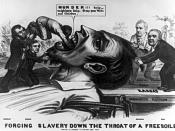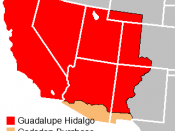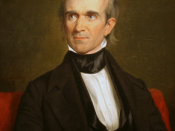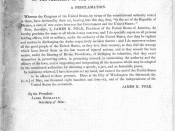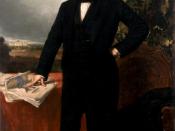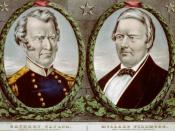Every country has its leaders; some receive more respect and admiration then others. The United States of America has had 43 different presidents in its 225 years of existence. John Tyler, James K. Polk, Zachary Taylor, Millard Fillmore, Franklin Pierce, and James Buchanan, are not the best remembered of these presidents. Even so, they too made substantial contributions to the United States of America that should not be overlooked under any circumstances.
John Tyler became our 10th president after the death of William Henry Harrison in 1841. During his term as president, which came to be known as "his accidency," Tyler did manage to make some good decisions for our country. In 1841 Tyler signed the bill recognizing squatter's rights to public lands into law, this was known as the Preemption Act. This law sped settlement of Illinois, Wisconsin, Minnesota and Iowa. Also, on March 1, 1845 signed a resolution passed by the House and Senate admitting Texas to the Union with dividing lines separating free and slave parts of the state, Texas was not officially admitted until Tyler was out of office in December.
Possibly Tyler's biggest achievement was gaining the United States access to Chinese Ports for the first time in history. Tyler brought and end to the Seminole War in Florida in 1842. The same year, a dispute with Great Britain over the boundary dispute between Maine and Canada was settled on terms laid out by his Secretary of State Daniel Webster.
On March 4, 1845, President James Knox Polk took office. Polk is one of the most forgotten presidents in American history. During his time in the White House, the Polk's held informal evening receptions twice a month in the Executive Mansion where gaslights replaced oil lamps and candles for the first time. Polk was in favor of a tariff for revenue only, with "protection being incident and not the object." Drafted by Secretary of Treasury Robert J. Walker this tariff included some protective measures. But it admitted tea and coffee duty-free and also generally lowered rates. Polk was also the president during the Mexican American War (1846-1848), "a War fought largely due to strained relations by the U.S. annexation of Texas and a border dispute between the U.S. and Mexico." The Treaty of Guadalupe Hidalgo ended the war and fixed the border at the Rio Grande River. A few months after the War, Polk reaffirmed and extended the Monroe Doctrine in a special message to congress. The president said that the doctrine was "our settled policy, that no further European colony or dominion shall, with our consent, be planted or established on any part of the North American Continent." In 1846 the Oregon Treaty was put into effect, this treaty with Great Britain fixed the border between the U.S. Northwest and Great Britain granting the U.S. land that is now the present day states of Oregon and Washington.
Zachary Taylor was president for the short time between March 5, 1849 and July 9, 1850. Before becoming ill and passing away, Taylor was able to do some noteworthy things. In 1850, the United States, along with Great Britain signed the Clayton-Bulwer Treaty, a Treaty between the U.S. and Great Britain stipulating that any canal constructed across Central America was to be neutral and that neither country could colonize any part of Central America. Also, in 1849 controversy over the extension of slavery into new territories reached new heights as California and New Mexico prepared to enter the union. Taylor hoped to avoid dispute by urging Congress to admit California and New Mexico immediately as states rather than making them territories first. Taylor sided with the North when debates arose in Congress between the North and South over slavery, adding to the South's wanting to secede from the Union (McPherson, pp. 411).
Millard Fillmore is next in the line of no name presidents. Fillmore became president on July 10, 1850, a day after the death of Zachary Taylor; his term would last only three years, but in that time he made some decisions for our country. Millard embraced the Compromise of 1850 which, allowed California to be admitted as a free state and enforced the Fugitive Slave Act with suspected fugitives being denied the right to a trial; it helped ward off the Civil War. During Fillmore's Administration, Congress reduced the basic postal rate from 5 to 3 cents. "In late 1852 the President sent Commodore Matthew C. Perry on an expedition to the Far East." Two years later, after Fillmore had left the presidency, this voyage resulted in the first trade with Japan.
On March 4, 1853 Franklin Pierce was sworn in as president of the United States of America, a title he would hold until March 3, 1857. In January 1854, Senator Douglas introduced a bill he hoped would hasten frontier settlement. Pierce supported this bill, which came to be known as the Kansas-Nebraska Act, even thought it threatened to upset the uneasy slavery truce established between the North and South by the compromises of 1820 and 1850. This bill provided that settlers in new territories would decide for themselves whether or not to permit slavery. Pierce was also involved with the expansion of America. In 1853 Pierce advocated the annexation of Hawaii. This eventually fell through, partly because King Kamehameha died. The Gadsden Purchase of 1853 provided the country with a southern railroad route to the Pacific Coast and settled the boundary question with Mexico.
The last no name president to be discussed is James Buchanan, sworn into office on March 4, 1857, and was president when the South declared their independence. In attempts to come to a compromise between the North and South Buchanan would try to unite Democrats from each section by balancing his appointments to public office. Buchanan was commonly thought of as being partial to the South. To illustrate, at White House social functions, Southerners often far outnumbered Northerners. Buchanan's support of the Dred Scott Decision also seemed to further hint at Southern favoritism. Buchanan developed firm policies in foreign affairs. "His experience as a diplomat helped him better establish relations with Great Britain." Problems the Americans had with the British lands in Central America were solved when Britain signed treaties with Nicaragua and Honduras that the Buchanan administration approved. Another major happening during Buchanan's presidency was the Panic of 1857 "in which the failure of the Ohio Life Insurance Company of Cincinnati heralded the start of an economic panic which lasted until the start of the Civil War." None of these men are greatly revered for the accomplishments made during their respective terms as president. That alone however does not mean that they should overlooked by anyone living in our country today. Each of these "no name presidents" made significant impacts on our country, and for all the things they have done, both listed above and otherwise they deserve the thanks and praise of all those who live in America today.
